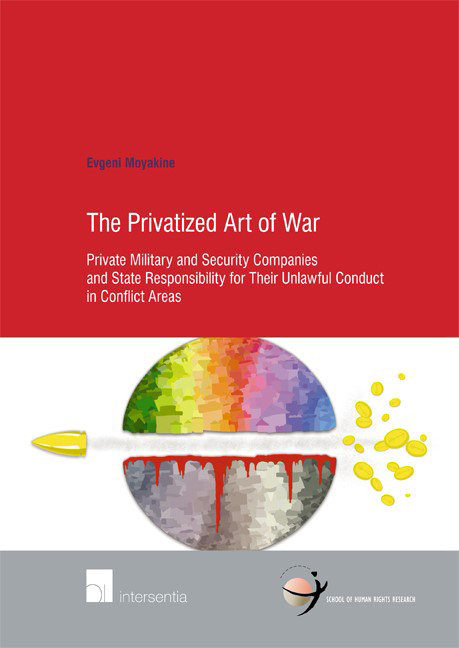 The Privatized Art of War
The Privatized Art of War Book contents
- Frontmatter
- Dedication
- Acknowledgments
- Contents
- List of Abbreviations
- Chapter I General Introduction
- Chapter II Privatization of War and Security – War is Business and Vice Versa
- Chapter III Existing Legal Framework of PMSC Operation
- Chapter IV Legal Status of PMSC Employees
- Chapter V State Responsibility under the Draft Articles on State Responsibility
- Chapter VI State Responsibility for Non-Compliance with Positive International Law Obligations
- Chapter VII Summary, Overall Conclusions, and Final Observations
- Dutch Summary — Nederlandse Samenvatting
- Russian Summary — KPATKOE COДEPЖAHИE KHИГИ HA PУCCKOM ЯэЬІKE
- Selected Bibliography
- Table of Cases
- Selected United Nations Documents
- Index
- Curriculum Vitae
- School of Human Rights Research Series
Chapter II - Privatization of War and Security – War is Business and Vice Versa
Published online by Cambridge University Press: 28 November 2017
- Frontmatter
- Dedication
- Acknowledgments
- Contents
- List of Abbreviations
- Chapter I General Introduction
- Chapter II Privatization of War and Security – War is Business and Vice Versa
- Chapter III Existing Legal Framework of PMSC Operation
- Chapter IV Legal Status of PMSC Employees
- Chapter V State Responsibility under the Draft Articles on State Responsibility
- Chapter VI State Responsibility for Non-Compliance with Positive International Law Obligations
- Chapter VII Summary, Overall Conclusions, and Final Observations
- Dutch Summary — Nederlandse Samenvatting
- Russian Summary — KPATKOE COДEPЖAHИE KHИГИ HA PУCCKOM ЯэЬІKE
- Selected Bibliography
- Table of Cases
- Selected United Nations Documents
- Index
- Curriculum Vitae
- School of Human Rights Research Series
Summary
Force should be right; or, rather, right and wrong - Between whose endless jar justice resides - Should lose their names, and so should justice too. Then everything includes itself in power, Power into will, will into appetite; And appetite, an universal wolf, So doubly seconded with will and power, Must make perforce an universal prey, And last eat up himself.
William ShakespeareWar … always has been a matter of profit and spoils. What is changing is how the profits are distributed.
Kathleen M. JenningsINTRODUCTION
Without doubt, in the past two decades, private military and security companies hired by a large number of entities have become important actors in both the international arena and domestic affairs of a large number of States. Many scholars agree that there are signs of a “revolution in military affairs”: nowadays, PMSCs freely operate around the world and take an active part in not merely peace support operations, but also international and non-international armed conflicts. They are frequently employed by States in the situations of armed conflict, by non-State entities participating in hostilities in internal conflicts, by international organizations in the course of conducting peacekeeping missions, and even by private companies paying large amounts of money for their military and security expertise. It is no secret that the concept of PMSCs as private corporations exercising core State functions has been around for longer than 20 years. Nowadays, the industry of private military and security specialists still shows signs of significant development and unprecedented growth. Currently, the world has to deal with many challenges posed by the emergence and proliferation of these companies. There are regulatory issues associated with the PMSC industry, transparency and legitimacy concerns raised against its representatives, problems of individual accountability and State responsibility for the actions of private warriors, who carry weapons, fight wars, and protect persons and assets of legitimate governments and other actors. Before going into the substance of the discussion focusing on the responsibility of States for the illegal conduct of those corporations, some attention should be devoted to the historical developments in the field of the use of force by private persons and entities.
- Type
- Chapter
- Information
- The Privatized Art of WarPrivate Military and Security Companies and State Responsibility for Their Unlawful Conduct in Conflict Areas, pp. 45 - 104Publisher: IntersentiaPrint publication year: 2015
